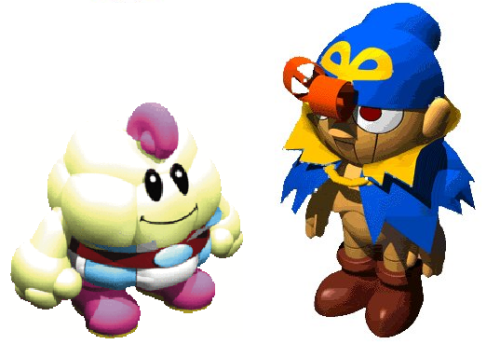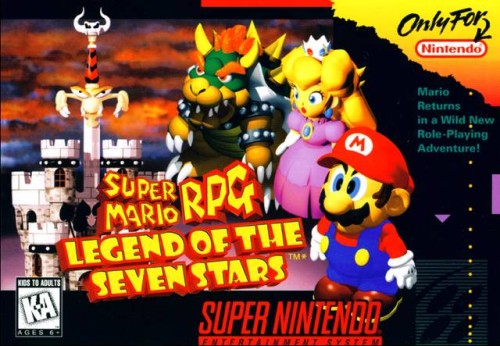And… I liked it. I did.
Yet I didn’t love it as much as everyone else seems to.
It deserves credit for laying down the groundwork for subsequent games. In Super Mario RPG, I see the origin of both Paper Mario and Mario & Luigi’s gameplay.
For example, you can use timed hits, which add an element of action to the turn-based battles by letting you increase the power of your attacks or defend through good timing. Aside from that, it plays like a typical turn-based RPG, although your party shares a single FP (magic) pool.
Super Mario RPG also has a traditional party system. Over the course of the game, several characters join your party, and you choose which ones to have in your battle party. Neither Paper Mario nor Mario & Luigi do this, and it’s a system I’d like to see explored again by Mario RPGs.
Although it follows several JRPG traditions, it doesn’t have an overworld like classic Final Fantasy games. (This disappointed me, since I love world maps.) While areas do connect to one another, each is accessible from a map more akin to a traditional Mario level-select screen.
The areas themselves are charming (although every dungeon had at least one part that annoyed me), and I enjoyed the character interactions. There were several fun NPCs and enemies, and the party was entertaining as well. Super Mario RPG also seems to have begun the tradition of portraying Bowser in a more sympathetic light, as he’s a decent ally and a good boss to the minions you meet in Monstro Town.
 I had high hopes for the original characters who join the party, in part because I hear praise for Geno wherever I go. You know what, though? I liked Mallow better.
I had high hopes for the original characters who join the party, in part because I hear praise for Geno wherever I go. You know what, though? I liked Mallow better.
Not in combat, no. Once the princess leveled up enough to survive battles, I barely used Mallow. But in terms of the story, Mallow had character development, an interesting premise, and an enjoyable subplot.
Geno… was there to save the world.
Saving the world is great and all… but I never got a good sense for Geno as a character.
And that brings me to my final concern: the story. People talk about how Super Mario RPG has a deep, epic story. Could someone please explain that to me?
To me, Super Mario RPG’s story felt pretty basic. Sure, the first Paper Mario had a basic story, too, but people don’t herald it as epic. And yes, it’s an old game, but Super Mario RPG was made two years after Final Fantasy VI, so epic RPG stories existed at the time.
But after all this criticism, I want to repeat what I said at the start: I liked Super Mario RPG. I’m happy I played it, and I enjoyed playing it.
I just never felt myself dying to play more.


You claimed to take a controversial stance.
Not really sure what’s controversial here.
I’m not in love with the game and I don’t see what’s so great about Geno.
That should be standard operating procedure, not controversial.
It goes against the majority, so I dubbed it controversial (like not being a Godot fan).
I’ll try to be more radical the next time I say something’s controversial. 😉
Maybe I’m used to my standards of what’s controversial…
…Anyway, the majority is pretty dumb here.
You set a pretty high bar for controversial.
Debates such as this one make me feel I just tried it too late.
Reading this thread makes me feel like I’m reading why people say Undertale is the best game ever.
Can we agree that coming up with a list of moments in the game or giving a list of bosses and acting like the act of giving a name is itself evidence of greatness is not a proper method to evaluate games?
Of course, because Tales of Symphonia holds the spot of best game ever! 😉
I agree that just giving a name doesn’t prove a game’s greatness (unless you’re talking to people who haven’t played it and you don’t want to spoil why those characters are great).
A list of moments, though, that could be used in discussions of a game’s story. For example, I tend to cite case 4 as the reason Justice for All is still a good game despite being my least favorite Ace Attorney game.